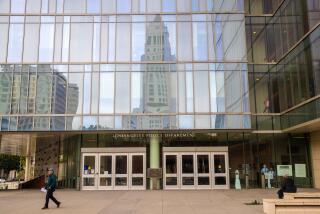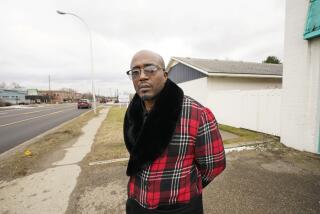Op-Ed: Jeff Sessions thinks consent decrees increase crime. He’s just plain wrong

Atty. Gen. Jeff Sessions dislikes police consent decrees — court-enforced settlements between the Department of Justice and cities that are intended to eliminate the use of excessive force and racial profiling in policing.
On April 4, Sessions announced that his Justice Department would review all “existing or contemplated” police consent decrees. In a radio interview, he argued that they “push back against [officers] being on the street in a proactive way,” because they “reduce morale.” Consequently, he said, cities under consent decrees have “seen too often big crime increases.”
That’s not what the facts show. I serve as monitor of a consent decree entered into in Seattle in 2011, when a federal investigation identified a “pattern and practice” of unconstitutional use of force by that city’s police department. Two days after Sessions’ announcement, my monitoring team reported that Seattle had achieved initial compliance with the Justice Department’s requirements: Incidents of overall force and problematic force have decreased without an increase in officer injuries or crime.
The numbers show no obvious connection between use of force rates and crime rates.
We have found that under the consent decree, Seattle’s police are not being placed at any higher risk, nor are they less able or willing to use force to defend themselves than in the past. Of particular note: The drop in use of force hasn’t negatively affected public safety. Indeed, the numbers show no obvious connection between use of force rates and crime rates.
Such assessments wouldn’t even have been possible without the consent decree reforms. When the process began in Seattle, the SPD’s policies related to force were contradictory and confusing. Incidents often went unreported, and when they were documented, the write-ups were generally stuffed, unreviewed, into file cabinets. In rare cases where use of force was investigated, the inquiries were inadequate. (Similar problems have surfaced recently in Albuquerque, Baltimore and Chicago.)
As is the case with most police consent decrees, the one in Seattle required the SPD to work with community representatives to revamp its use of force policies, to retrain officers, to establish new “de-escalation” approaches for interacting with the mentally ill, and to modernize procedures for reporting, investigating and reviewing use of force.
The results have been impressive. In our latest report, which covered a 28-month period, there was a 60% reduction in the use of moderate to severe force compared with the DOJ’s initial investigation. Less than 0.00003% of all SPD encounters involved any such use of force. Moreover, force that was problematic or inconsistent with the department’s new policies was exceedingly rare — occurring less than 1% of the time.
Although the concept of public safety can be measured in many different ways, the failure of the data to show crime going up as force has gone down gave the monitoring team confidence that the reforms weren’t compromising the welfare of the city.
At the same time, public trust in the Seattle Police Department has steadily increased. An independent polling company has found the department’s approval rating rising among all ethnic groups, from 60% (2013) to 64% (2015) to 72% (2016). Among African Americans the change was even more pronounced: 49% approval in 2013 versus 62% in 2016; and among Latinos, 54% in 2013 versus 74% in 2016. Outright disapproval has trended down, from 34% in 2013 to 20% in 2016 overall.
Although it is hard to definitively establish, expanded community confidence appears to be inspiring more cooperation with the police in solving crime and addressing neighborhood problems.
Seattle’s consent decree experience mirrors that of Washington, D.C., New Orleans and Los Angeles, after its 12-year consent decree following the Rodney King beating and the Rampart scandal. Reform can be difficult, and it is not a trivial municipal expense, but the benefits are clear — including fewer civil rights lawsuits that can cost police departments and their cities millions in settlement dollars.
Consent decrees should be embraced by officers and politicians alike. Still, some police departments and their powerful public-employee unions fear the scrutiny and accountability demanded by the decrees. The Seattle experience, however, should dispel the myth that consent decrees doom officers and cities to reduced protection and higher crime rates.
Since 1994, when Congress empowered the Department of Justice to act in civil court cases against police misconduct, U.S. cities have made steady progress in the management of use of force and racial profiling. It would be tragic if the Trump administration’s Department of Justice turned its back on that progress, depriving Americans of the effective, safe and constitutional policing that Seattle’s consent decree demonstrates is possible.
Merrick J. Bobb is the executive director of the nonprofit Police Assessment Resource Center. He monitored practices at the Los Angeles Sheriff’s Department from 1992 to 2015 and was special counsel to the Los Angeles Police Commission.
Follow the Opinion section on Twitter @latimesopinionand Facebook
More to Read
A cure for the common opinion
Get thought-provoking perspectives with our weekly newsletter.
You may occasionally receive promotional content from the Los Angeles Times.






